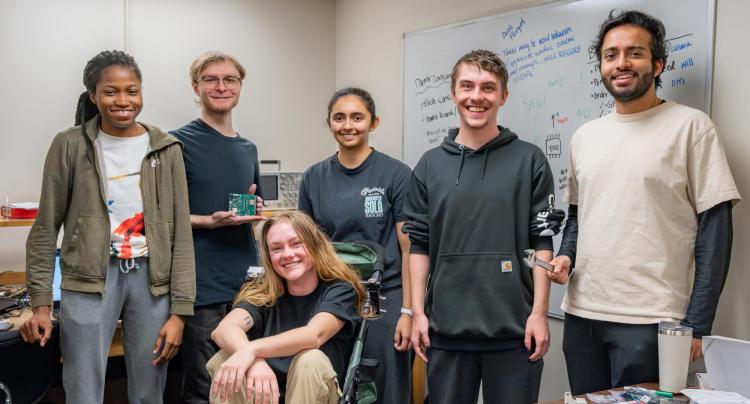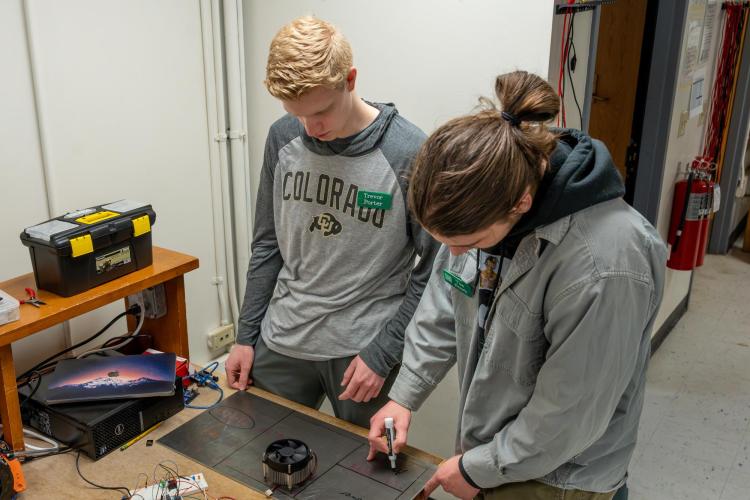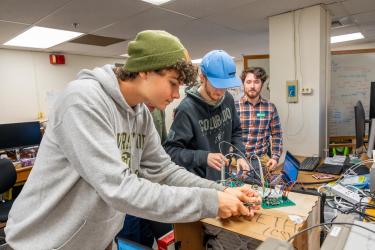 Fourteen student teams from the Department of Electrical, Computer & Energy Engineering (ECEE) will showcase their capstone design projects at the upcoming Engineering Projects Expo 2024 on Friday, April 26.
Fourteen student teams from the Department of Electrical, Computer & Energy Engineering (ECEE) will showcase their capstone design projects at the upcoming Engineering Projects Expo 2024 on Friday, April 26.
This year, team projects impact critical areas in sustainability, assistive technologies, communications, microgrid power distribution and new sensing technologies.
The ECEE Capstone Design course is a two-semester course for every senior in the department. Students collaborate as teams to design a product from concept to prototype. Each team partners with a sponsoring organization to define a product, determine suitable technology options and create a design from proof to final custom hardware and software.
Through these hands-on experiences, students gain essential career skills into practice as professional engineers.
Capstone Design, led by Scholar in Residence Eric Bogatin, has 10 industry sponsors and four faculty sponsors. Their organization sponsors include: Medtronic, NASA’s Jet Propulsion Laboratory (JPL), the Colorado Space Grant Consortium, Line Vision, Microchip Technologies, SparkFun, Fieldline, LUUM, Quality Life Plus and Augustus Aerospace.
Projects you will see at the Expo 2024 include:
-
Team The Band is designing and building a new product for SparkFun Electronics — a home air quality monitor. A small sensor box will sit in your home, and an app on your smartphone will give you access to the current air quality and a recorded history. Features in the user interface will be suitable for the casual user and the scientist inside all of us.
-
 Team Trailblazers is working with Quality of Life Plus, a nonprofit organization focused on providing increased quality of life to veterans. They are building a mobile sensor cart to help assess the quality of a hiking trail for the disabled. A sensor suite monitors grade, tilt, roughness and other hiking aspects, geotags the data and uploads the trail metrics to a mapping database which can be accessed by hikers.
Team Trailblazers is working with Quality of Life Plus, a nonprofit organization focused on providing increased quality of life to veterans. They are building a mobile sensor cart to help assess the quality of a hiking trail for the disabled. A sensor suite monitors grade, tilt, roughness and other hiking aspects, geotags the data and uploads the trail metrics to a mapping database which can be accessed by hikers.
-
Team Formula 10 is designing and building an automatic room air purifier working off of a 48-volt microgrid. This system will monitor the indoor air quality, such as particle count, temperature, humidity and CO2 level. When it exceeds a threshold, the purifier activates a fan with a filter and UV purification lights. Since it is powered by a microgrid, the efficiency of the power delivery system is monitored and new power conversion technologies are demonstrated.
-
Team JALATT is working with JPL to design and build a self-aligning connector system for autonomous, self-assembling CubeSats. A custom test bed will help evaluate the contact resistance, leakage and signal bandwidth for power and data flow between CubeSats. This test bed will initially be demonstrated with a prototype connector design, which JPL will use to test future connector technologies.
-
In collaboration with the Colorado Space Grant Consortium, Team Oval is designing a prototype Luna Sat sensor network. This is a collection of small, solar-powered circuit boards that will self-assemble into a wireless network of sensor nodes. This initial version will be used on Earth and distributed as a kit to 9-12th grade students around the world as part of the Great Lunar Expedition for Everyone (GLEE) project. This will give students a chance to explore remote data acquisition experiments.
 In the ECEE Department, student teams are collaborating with the following faculty members:
In the ECEE Department, student teams are collaborating with the following faculty members:
-
Distinguished Professor Dragan Maksimovic is sponsoring a project on air quality monitoring and controls.
-
Assistant Professor Marco Nicotra is sponsoring a project on using a laser link to control a remote drone.
-
Professor Al Gasiewski is sponsoring a project on remote sensing to map atmospheric emissions in the k-band
-
Distinguished Professor Zoya Popovic is sponsoring a project on transmitting useful power to a ground station from a drone.
-
Professor Scott Diddams is advising a team using an atomic clock to stabilize a grandfather clock.
Check out all student teams on April 26 from 2 to 5 p.m. at the CU Indoor Practice Facility!
 Fourteen student teams from the Department of Electrical, Computer & Energy Engineering (ECEE) will showcase their capstone design projects at the upcoming Engineering Projects Expo 2024 on Friday, April 26.
Fourteen student teams from the Department of Electrical, Computer & Energy Engineering (ECEE) will showcase their capstone design projects at the upcoming Engineering Projects Expo 2024 on Friday, April 26.  In the ECEE Department, student teams are collaborating with the following faculty members:
In the ECEE Department, student teams are collaborating with the following faculty members:
 Team Trailblazers is working with Quality of Life Plus, a nonprofit organization focused on providing increased quality of life to veterans. They are building a mobile sensor cart to help assess the quality of a hiking trail for the disabled. A sensor suite monitors grade, tilt, roughness and other hiking aspects, geotags the data and uploads the trail metrics to a mapping database which can be accessed by hikers.
Team Trailblazers is working with Quality of Life Plus, a nonprofit organization focused on providing increased quality of life to veterans. They are building a mobile sensor cart to help assess the quality of a hiking trail for the disabled. A sensor suite monitors grade, tilt, roughness and other hiking aspects, geotags the data and uploads the trail metrics to a mapping database which can be accessed by hikers. 

